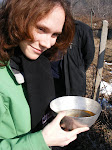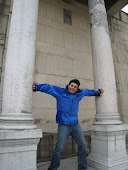Historical Bulgarian of the Week - Vasil Levski:
Wednesday, April 2, 2008
If you are a Bulgarian, a member of Peace Corps Bulgaria and/or moderately aware of Bulgarian History, you already know who this man is.
Vasil Levski (in Bulgarian is "Васил Левски") is by far the most popular figure in all of Bulgaria. His name is known by both young and old. Stories of his life and times are commonly told as his legacy is passed down from generation to generation.
I would argue that no more famous Bulgarian has ever lived or will ever live. Vasil Levski is the mother of all Bulgarian Historical figures, and I embark on this grave quest, wishing to do his legacy justice I need you dear readings to wish me health, happiness and luck!
To further explain how big of a deal writing a post on Levski is to the non-Bulgarian readers I will parallel him to an American Historical figure. Abe Lincoln? No, too honest (or was he?!?!)... and too beardy!
and too beardy! Kennedy? Nope, not revolutionary enough.
Kennedy? Nope, not revolutionary enough.  (Example: Would a revolutionary be hanging out on his sail boat alone the coast of Maine? I most certainly think not!)
(Example: Would a revolutionary be hanging out on his sail boat alone the coast of Maine? I most certainly think not!)
Ben Franklin? Nah, too wimpy.  ...and plus, he wanted the turkey to be the national bird?!?!
...and plus, he wanted the turkey to be the national bird?!?! George W. Bush?
George W. Bush?  (Picture taken in 2003 aboard the USS Abraham Lincoln) Not smart enough, but the name is closer. Try again.
(Picture taken in 2003 aboard the USS Abraham Lincoln) Not smart enough, but the name is closer. Try again.
George Washington? Ding! Ding! Ding! We have a winner!
If I had to chose the closest American historical figure to Bulgaria's Levski, I would have to pick George Dub-yah! Well at least I think so. No Levski did not chop down any Cherry Trees...
No Levski did not chop down any Cherry Trees... However, they both had long, lasting legacies. Their names are synonymous with the histories of their countries. They both sacrificed as much as they could for their respective countries and in return will be taught about in schools until the end of time.
However, they both had long, lasting legacies. Their names are synonymous with the histories of their countries. They both sacrificed as much as they could for their respective countries and in return will be taught about in schools until the end of time.
Not to mention that they both have everything possible named after them. For example George Washington has the Washington Monument, as well as... ...the greatest of all 50 states, and another famous thing named after George Washington is...
...the greatest of all 50 states, and another famous thing named after George Washington is... ...Denzel Washington...
...Denzel Washington... And for Mr. Levski?
And for Mr. Levski? One of the Bulgarian National Football teams...
One of the Bulgarian National Football teams...


 ...Levski has even inspired Bart Simpson (Even if this is in reference to the Football team I still had to post it as I found it extremely amusing)!
...Levski has even inspired Bart Simpson (Even if this is in reference to the Football team I still had to post it as I found it extremely amusing)! ...In the 1990's he graced the 1,000 Leva Bill...
...In the 1990's he graced the 1,000 Leva Bill... ...he has been figured on postage stamps...
...he has been figured on postage stamps... ...and of course, in a country filled with statues, he has graced hundreds and hundreds if not thousands of statues...
...and of course, in a country filled with statues, he has graced hundreds and hundreds if not thousands of statues...

Vasil Levski, was born under the name "Vasil Ivanov Kunchev" (or "Васил Иванов Кунчев" in Bulgarian) on either 18 July or 6 July in the year of 1837 in the city of Karlovo, Bulgaria (Sidenote- Blogs from Peace Corps Volunteers from Karalvo can be found here; Cindy McCoy and Eric Wiley).
What did he do that was so special? So incredible that years after his death his name is mentioned every where? One web-site in brief had this to say, "[Levski was a] revolutionary, ideologist, strategist and theoretician of the Bulgarian national revolution and leader of the struggle for liberation from Ottoman rule".
Another web-site mentioned his love for Bulgarian and Bulgarians love for him, saying "All Bulgarians have loved and love him unconditionally. The doors of every Bulgarian house were open for him at all times. He had no close friends, no family, no home, and no personal life. His only thought his only love, his only passion was Bulgaria".
Lets start at the beginning...
As I mentioned before young Vasil was born in Karlovo in 1837. At the time Karlovo was than a "prosperous center of craft-industry". He earned two nicknames from a very young age that will forever be associated with his name.
One is "The Deacon" because at age 24 (1861) he took the vows of... yeah you guessed it, a Deacon. However, "the lot in store for the young Bulgarian was obviously not the one of a monk living in resignation to the world". Apparently not for religious reasons, as he continued to mention God in his writings until the day he died, he fled to Serbia after one year (1862) to join the liberation movement.
The other was his new last name, "Levski" which means "like a lion" in Bulgarian, and most likely the reason why lions are one of Bulgarias national symbols even being located on the Bulgarian Coat of Arms: Some kids here have even told me that the country of Bulgaria ITSELF is shaped like a lion:
Some kids here have even told me that the country of Bulgaria ITSELF is shaped like a lion: How he inspired the name "Levski" was told by one web-site really well, "Vasil had got the nickname Levski during his service in the First Bulgarian legion (...) in Belgrad. One day during a training, the young legionnaires were jumping over a deep ditch. Like a lion, Vassil had jumped the farthest... [It was said,] 'That is a Levskii jump!' ". True or not, it is a great story and I like it!
How he inspired the name "Levski" was told by one web-site really well, "Vasil had got the nickname Levski during his service in the First Bulgarian legion (...) in Belgrad. One day during a training, the young legionnaires were jumping over a deep ditch. Like a lion, Vassil had jumped the farthest... [It was said,] 'That is a Levskii jump!' ". True or not, it is a great story and I like it!
Apparently Levski was very involved in the assult as a few web-sites claimed him to have, "participated in all (or "almost all" depending on the source) Bulgarian armed assaults against the Ottoman Empire" from 1862-1868. After that until 1872 Levski, came up with the idea, organized and helped to build the Internal Revolutionary Organization (IRO).
Levskis idea was to make the revolution truly a Bulgarian one. He wanted all of the soldiers to be Bulgarians and Bulgarians only. This was because foreign involvement had only been shown to bring "trouble and failure to the national revolutionary cause".
To do so Levski, and others, toured Bulgarian towns and villages to form a network of revolutionary committees to equip the men in their regions. These people were "usually peasants and craftsmen" by trade and they were taught how to use weapons and they were trained to fight.
During that same time he charted out his ideas for Bulgaria's future political system and his wish was for a democratic republic, one he called, "pure and holy", that would be based along the principles of the Human and Citizen Rights Charter of the French Revolution because he believed in the principles of freedom of expression, speech, association and religion. He made sure to reiterate that Bulgarian revolutionaries were fighting against the Sultan's government, not against the Turkish people and/or their religion and he had no tolerance for corruption (no comment on the current state of the Bulgarian Government... none).
In late 1872 Levski feel into the hands of the Turkish authorities. He was put on trial and sentenced to death by hanging. On 18 February 1873 Vasil Levski was hung.
The IRO committee that he had set up continued to function after his death. In 1876 there was the "April Uprising" which failed but lead the way for a war between Russian and Turkey called apropriately enough the Russo-Turkish War which took place in 1877-78 and eventually ended the "Turkish Yolk" after nearly 500 years.
Vasil Levski has inspired books and poems and poems such as the famous one by Historical Bulgarian of the Week #1 Hristo Botev, called "The Hanging of Vasil Levski". Recently one newspaper referred to this poem as having, "been recited and quoted at various occasions and every child knows of 'The Hanging of Vasil Levski' - one of the strongest poems of both past and present".
Here is that famous poem, translated into English:
The Hanging of Vasil Levski
O my Mother, dear Motherland
Why weep you so mournfully, so plaintively?
And you, raven, cursed bird -
On whose grave croak you with such a dread?
Ah, I know - I know you're weeping, Mother
Because you are a dismal slave,
Because your holy voice, Mother
Is a helpless voice - a voice in the wilderness.
Weep! There, near the edge of Sofia town
Stretches - I saw it - a dismal gallows
And one of your sons, Bulgaria
Hangs from it with a terrible power.
The raven croaks dreadfully, ominously
Dogs and wolves howl in the fields,
Old people pray to God with fervor
Women weep, children cry.
Winter croons its evil song,
Gales sweep thistle across the field
And cold and frost and hopeless weeping
Heep sorrow on your heart.
Translated by © Thomas Butler. All rights reserved!
Thank you all for reading. It has been a lot of work compiling this weeks entry but for a figure as important as Levski I knew it had to put in some time. I hope that I did the man justice. Take care everybody.
-Kashkaval Pane
Some of the many Web-Sites were I found information:
http://www.novinite.com/view_news.php?id=90525
http://www.answers.com/topic/vasil-levski
http://www.bgglobe.net/index.php?l=1&s=-2535
For the Web-Site for the Vasil Levski Museum (located in Karlovo, Bulgaria) in English CLICK HERE
Posted byPavel at 9:42 PM
Labels: Bulgarian History







Nice entry, Tyler - I enjoyed it! You forgot to mention one other famous 'George Washington' - our very own city of George, Washington!
Epic господин пане! I would have went with Martin Van Buren myself, but epic none the less.
There is a lot more behind him.